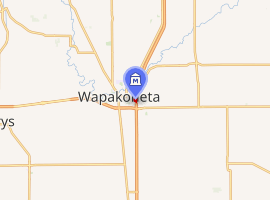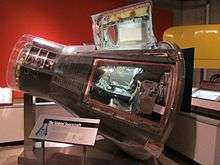Armstrong Air and Space Museum
The Armstrong Air and Space Museum is a museum in Wapakoneta, Ohio, United States, the hometown of Neil Armstrong, first man to set foot on the Moon. The museum chronicles Ohio's contributions to the history of aeronautics and space flight. Among the items on display are an F5D Skylancer, the Gemini 8 spacecraft in which Armstrong flew (and in which he made the first space docking), Apollo 11 artifacts, and a Moon rock. In the museum's Astro-theater, multimedia presentations and documentaries are cast upon the famous dome's interior structure.
The entrance to the Armstrong Air and Space Museum in August 2012 | |

| |
| Former name | Neil Armstrong Air & Space Museum |
|---|---|
| Established | 20 July 1972 |
| Location | Wapakoneta, Ohio |
| Type | History/Science Museum |
| Accreditation | American Alliance of Museums |
| Visitors | > 40,000 |
| Executive director | Dante Centuori |
| President | Greg Myers |
| Website | www |

The Armstrong Museum is located just west of Interstate 75 at exit 111 (Bellefontaine Street) in Wapakoneta. The museum is operated by the Ohio History Connection and had no formal relationship with Armstrong prior to his death. The museum is a partner site of the National Aviation Heritage Area.[1]

Neil Armstrong's early years
Neil Alden Armstrong was born on August 5, 1930 on his grandparents' farm, in Washington Township, Auglaize County, near Wapakoneta to Stephen and Viola Armstrong. Neil was the oldest of the Armstrong's three children. Stephen Armstrong was an auditor and was tasked with examining the books from different Ohio counties. The family moved over thirteen times during Neil's childhood, eventually settling back down in Wapakoneta in the mid-1940s.[2] During Armstrong's life in Wapakoneta, he graduated high school and received his pilots license from the now defunct Port Koneta Airfields located on the North end of Wapakoneta. After graduation, Neil went to college at Purdue University to study aeronautical engineering. His schooling was interrupted when the Navy called upon Armstrong to fight in the Korean War conflict.
Museum history
At the time of Neil Armstrong's first step onto the Moon, then Ohio Governor James Rhodes proposed to build a museum in Armstrong's hometown of Wapakoneta in his honor. The museum also was to honor "all Ohioans who have attempted to defy gravity."[3]
Today, exhibits also detail the feats of the Wright Brothers and Ohioan astronaut John Glenn.
Through Governor Rhodes, the State of Ohio pledged $500,000 dependent on local matching funds. A total of $528,313.55 was raised by Wapakoneta residents and other interested parties, including school children who held fund-raising drives."[3] Groundbreaking took place in 1970. The design was unique with earth mounded around the steel-reinforced concrete building, giving the building the semblance of being underground."[3] Its distinguishing feature is a large globe dome that houses the Astro Theater. On July 20, 1972, three years after the historic Moon landing, the museum held its grand opening, honored by the attendance of Armstrong and of Tricia Nixon Cox, standing in for her father, Richard M. Nixon, President of the United States."[3]
Late at night on July 28, 2017, a solid gold replica of an Apollo Lunar Module was stolen.[4]
In August 2020, the first production Learjet 28, which was used by Neil Armstrong to set five aerospace records, was donated to the museum.[5]
Museum exhibits
Crafts
- The Douglas F5D Skylancer
- The Aeronca Champion, the first plane Neil Armstrong learned how to fly in
- The Gemini 8 spacecraft, flown by Neil Armstrong and David Scott
- The Learjet 28 Longhorn, (display currently in development)
Suits/Garments
- Neil Armstrong's original Gemini VIII spacesuit
- Neil Armstrong's back-up Apollo 11 spacesuit
- In-flight suit worn by astronaut Eugene Cernan, the last man on the Moon
- Constant wear garment worn by astronaut Jim Lovell
- Flight garment worn by Ohio astronaut Tom Hendricks on STS-70
- Replica pressure suit worn by Shuttle Program astronauts
- A variety of Soviet garments
Aerospace
- United States flag taken on the Apollo 11 mission by Neil Armstrong
- Heel restraints on board Columbia during Apollo 11 mission
- A lunar sample - the NASA term for a Moon rock
- Apollo 11 heat shield fragment
- A replica Sputnik I
- Early space food, hygiene equipment, and sleeping bags
- Personal items from Ohio astronaut Judith Resnik
- Shuttle tire from the Space Shuttle Endeavour.[6]
The museum is designed for the experiential learner. There are several interactive exhibits, ten audio/visual elements, and two simulators.[6]
See also
References
- "Home of the Wright Brothers". National Aviation Heritage Area. Retrieved 16 March 2012.
- Neil A. Armstrong: Biography, brochure published by the Neil Armstrong Air and Space Museum, updated 2001
- Neil Armstrong Air and Space Museum: Ohio's Place in Space, published by the Ohio Historical Society, copyright 2000.
- "One small step for criminals: Someone burglarized the Armstrong Air and Space Museum". Washington Post. Retrieved 2017-08-02.
- Richardson, Joshua (5 August 2020). "Historic Learjet donated to Armstrong Air & Space Museum". Dayton 24/7 Now. Retrieved 7 August 2020.
- Discover the Moon brochure passed out on admission to the museum, published by the Ohio Historical Society.
External links
| Wikimedia Commons has media related to Armstrong Air and Space Museum. |